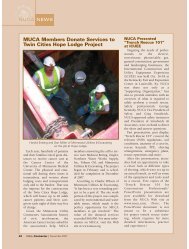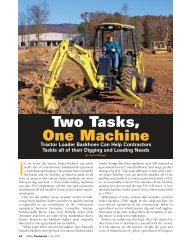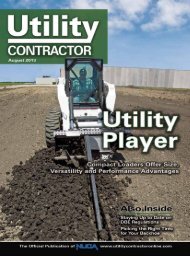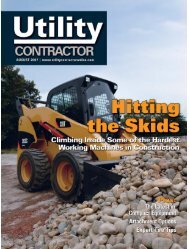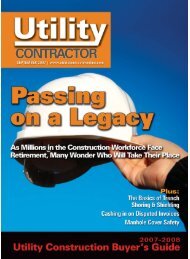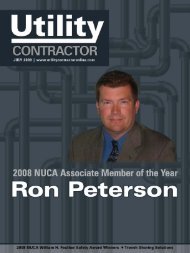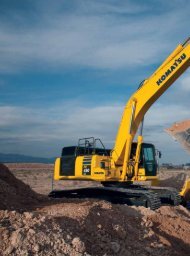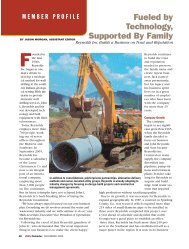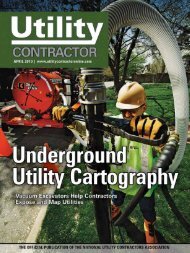View Full May PDF Issue - Utility Contractor Online
View Full May PDF Issue - Utility Contractor Online
View Full May PDF Issue - Utility Contractor Online
Create successful ePaper yourself
Turn your PDF publications into a flip-book with our unique Google optimized e-Paper software.
INSIDE WASHINGTON<br />
its version of the bill — and that’s another issue we’ll work<br />
at the Summit.<br />
Gearing Up for “Card Check” Rumble<br />
In what is being hyped as the biggest fight in the 111th<br />
Congress, the Employee Free Choice Act, better known<br />
as “card check,” was introduced in both the House and<br />
Senate in March. The legislation (HR 1409 /S 560)<br />
would allow for unionization of a company’s through a<br />
collection of a majority of “authorization cards” from a<br />
company’s employees in lieu of the secret ballot process<br />
currently provided for under the National Labor Relations<br />
Act (NLRA). On top of that, the card check bill<br />
also includes provisions for binding arbitration between<br />
workers and employers if the parties do not reach an<br />
agreement within 120 days and an increase in fines and<br />
penalties for unfair labor practices committed by employers.<br />
Labor’s ace in the hole was the support of Sen. Arlen<br />
Specter (R-Penn). The unions were counting on him<br />
to cast the critical 60th vote needed to end debate and<br />
bring the bill up for a final vote. However, when Specter<br />
said publicly that “the better way to expand labor’s<br />
clout in collective bargaining is through amendments to<br />
the NLRA rather than eliminating the secret ballot and<br />
mandatory arbitration,” all bets were off. At this point,<br />
card check supporters need to hold the support of all<br />
Democrats and at least one Republican Senator.<br />
That said, organized labor is reported to be running<br />
$10 million worth of ads in politically important states,<br />
where they hope grassroots advocacy will sway one or<br />
more moderate Republican senators. The lobbying has<br />
gone from intense to extreme, and all groups with a<br />
stake in this fight will be weighing in big time. NUCA<br />
will be one of them.<br />
Providing Affordable Health Care Still<br />
a Priority<br />
Besides the overwhelming challenges facing the underground<br />
utility construction industry and the shortage<br />
of work in various markets of interest, the rising costs of<br />
providing health care has been a huge concern for NUCA<br />
members. This year is no different. In years past, NUCA has<br />
supported Association Health Plan (AHP) or Small Business<br />
Health Plan (SBHP) legislation that would allow small businesses<br />
to pool their resources in order to provide quality<br />
health care to their employees at a more affordable cost.<br />
Although the current environment in Washington is<br />
such that stand-alone AHP/SBHP legislation in not politically<br />
viable, NUCA is working as a member of the Small<br />
Business Coalition for Affordable Healthcare (SBCAH) to<br />
include the fundamental concepts of the previous legislation<br />
into a much larger health care package, which is<br />
expected to be debated this year. The SBCAH strives to increase<br />
the access and affordability of health insurance for<br />
small-business owners, employees and the self-employed.<br />
The coalition will encourage lawmakers to include several<br />
provisions in comprehensive health care legislation,<br />
including:<br />
• Market-Based Pooling Arrangements to achieve<br />
greater purchasing clout, spread risk and lower administrative<br />
costs. This leads to increased affordability and<br />
choices for the purchase of private health insurance for<br />
business owners and their employees.<br />
• Tax-Based Health/Insurance Incentives to supplement<br />
the cost of private health insurance for employers,<br />
the self-employed and individuals.<br />
• New Healthcare Markets, Marketplaces and Products<br />
to provide flexibility to choose the health insurance<br />
packages that best meet the needs of the particular<br />
workforce.<br />
• Understandable and Easy-to-compare Healthcare<br />
Information to provide clarity and assist health care<br />
consumers (including employers) across the healthcare<br />
marketplace.<br />
The industry is hurting. There are now more than 2 million<br />
construction workers out of work and the unemployment<br />
rate for construction is now over 21 percent. There<br />
have been 21 consecutive months of significant job loss in<br />
the industry and construction has been hit harder by the<br />
economic downturn than any other industrial sector. Now<br />
is the time to fight for your industry.<br />
With your help we can continue to expand our markets<br />
and get the industry back on its feet. We can fight to<br />
preserve the secret ballot process in the workplace that<br />
is fundamental to our democracy. And, we can support<br />
commonsense health care reforms to enable employers<br />
to better provide health insurance to their employees at<br />
an affordable cost. If you are unable to attend the Washington<br />
Summit (<strong>May</strong> 18-20, Hotel Monaco, Alexandria,<br />
VA), we hope you will do your part from home. The<br />
Congressional Switchboard number is (202) 224-3121.<br />
Your industry needs you in the game. Won’t you give us<br />
a hand<br />
Eben Wyman is NUCA Vice President of Government Relations.<br />
<strong>May</strong> 2009 | <strong>Utility</strong> <strong>Contractor</strong> 107<br />
National <strong>Utility</strong> <strong>Contractor</strong>s Association




